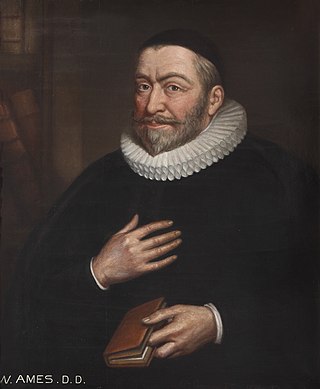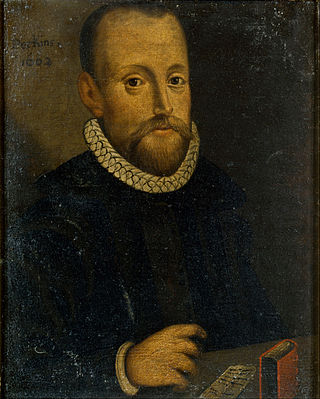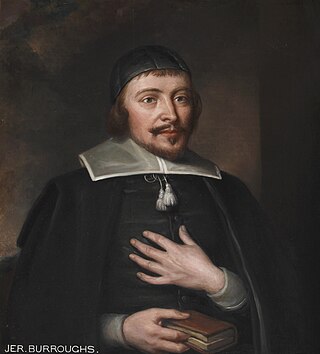Related Research Articles

William Ames was an English Puritan minister, philosopher, and controversialist. He spent much time in the Netherlands, and is noted for his involvement in the controversy between the Calvinists and the Arminians.

Philip Schaff was a Swiss-born, German-educated Protestant theologian and ecclesiastical historian, who spent most of his adult life living and teaching in the United States.

William Perkins (1558–1602) was an influential English cleric and Cambridge theologian, receiving a B.A. and M.A. from the university in 1581 and 1584 respectively, and also one of the foremost leaders of the Puritan movement in the Church of England during the Elizabethan era. Although not entirely accepting of the Church of England's ecclesiastical practices, Perkins conformed to many of the policies and procedures imposed by the Elizabethan Settlement. He did remain, however, sympathetic to the non-conformist puritans and even faced disciplinary action for his support.
John Ball was an English puritan divine.

John Howe was an English Puritan theologian. He served briefly as chaplain to Oliver Cromwell.

The Schaff–Herzog Encyclopedia of Religious Knowledge is a religious encyclopedia. It is based on an earlier German encyclopedia, the Realencyklopädie für protestantische Theologie und Kirche. Like the Realencyklopädie, it focuses on Christianity from a primarily Protestant point of view. The final edition, titled The New Schaff–Herzog Encyclopedia of Religious Knowledge, was published 1908–14 in 13 volumes, based on the third edition of the Realencyklopädie (1896–1909).

Christopher Love was a Welsh Presbyterian preacher and activist during the English Civil War. In 1651, he was executed by the English government for plotting with the exiled Stuart court. The Puritan faction in England considered Love to be a martyr and hero.

The Bangorian Controversy was a theological argument within the Church of England in the early 18th century, with strong political overtones. The origins of the controversy lay in the 1716 posthumous publication of George Hickes's Constitution of the Catholic Church, and the Nature and Consequences of Schism. In it, Hickes, as Bishop of Thetford, on behalf of the minority non-juror faction that had broken away from the Church of England after the Glorious Revolution, excommunicated all but the non-juror churchmen. Benjamin Hoadly, the Bishop of Bangor, wrote a reply, Preservative against the Principles and Practices of Non-Jurors; his own Erastian position was sincerely proposed as the only test of truth.

Thomas Watson was an English Puritan preacher and author. He was ejected from his London parish after the Restoration, but continued to preach privately.
Ibrahim al-Haqilani was a Maronite Catholic philosopher and linguist involved in the translation of the Bible into Arabic. He translated several Arabic works into Latin, the most important of which was the Chronicon orientale attributed to Ibn al-Rahib.

Samuel Simon Schmucker was a German-American Lutheran pastor and theologian. He was integral to the founding of the Lutheran church body known as the General Synod, as well as the oldest continuously operating Lutheran seminary and college in North America.

Jeremiah Burroughs was an English Congregationalist and a well-known Puritan preacher.
Lewis Bayly was a bishop of the Church of England.
John Purchas,, was an author and a priest of the Church of England who was prosecuted for ritualist practices. He received his education at Bury St Edmunds, Rugby School and Christ's College, Cambridge. He was curate of Elsworth, Cambridgeshire, 1851–53, of Orwell in the same county, 1856–59, and of St Paul's Church, Brighton, 1861–66 ; and perpetual curate of St James' Chapel, Brighton, after 1866.
Patrick Young, also known as Patricius Junius, was a Scottish scholar and royal librarian to King James VI and I, and King Charles I. He was a noted Biblical and patristic scholar.

Johannes Piscator was a German Reformed theologian, known as a Bible translator and textbook writer.

William Gouge (1575–1653) was an English Puritan clergyman and author. He was a minister and preacher at St Ann Blackfriars for 45 years, from 1608, and a member of the Westminster Assembly from 1643.

William Beveridge was an English writer and clergyman who served as Bishop of St Asaph from 1704 until his death.

William Greenhill (1591–1671) was an English nonconformist clergyman, independent minister, and member of the Westminster Assembly.

The reign of Elizabeth I of England, from 1558 to 1603, saw the start of the Puritan movement in England, its clash with the authorities of the Church of England, and its temporarily effective suppression as a political movement in the 1590s by judicial means. This led to the further alienation of Anglicans and Puritans from one another in the 17th century during the reigns of King James and King Charles I, that eventually brought about the English Civil War, the brief rule of the Puritan Lord Protector of England Oliver Cromwell, the English Commonwealth, and as a result the political, religious, and civil liberty that is celebrated today in all English speaking countries.
References
- ↑ Francis J. Bremer, Tom Webster, Puritans and Puritanism in Europe and America: A Comprehensive Encyclopedia (2006), p. 117.
- ↑ "Bradshaw, William (BRDW588W)". A Cambridge Alumni Database. University of Cambridge.
- ↑ "The Puritans and the Bible". 16 November 2007.
- ↑ "Philip Schaff: New Schaff-Herzog Encyclopedia of Religious Knowledge, Vol. II: Basilica - Chambers - Christian Classics Ethereal Library". www.ccel.org.
- Andrew Pyle (editor), Dictionary of Seventeenth Century British Philosophers (2000), article pp. 116–7.